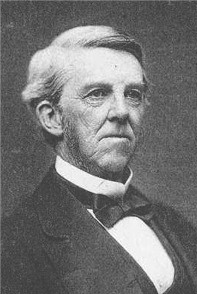Lately, I’ve become engrossed in reading “The Autocrat of the Breakfast Table.” First serialized in the nascent Atlantic Monthly and subsequently brought out in book form in 1858, Oliver Wendell Holmes’ humorous musings include any number of aphorisms about life and health, purportedly shared in dialogue over the first meal of the day in a boardinghouse.
“Just as we find a mathematical rule at the bottom of many of the bodily movements, just so thought may be supposed to have its regular cycles. Such or such a thought comes round periodically, in its turn.” (p. 56)
“Keep any line of knowledge ten years and some other line will intersect it,” Holmes observes. (p. 223)
I recently received a blanket mailing from the manufacturer of a type of infant formula touting its indication in the treatment of gastroesophageal reflux (GER) in the “happy spitter.” The communiqué referenced a clinical article on diagnosis and treatment of GER and gastroesophageal reflux disease (GERD) in children published in the May 2013 issue of Pediatrics. I read this article in its entirety twice: first, to glean the clinical information; and second, to relish the authors’ recommendations not to treat uncomplicated GER in spitty infants who were otherwise thriving and well.
According to the authors, “GER is considered a normal physiologic process that occurs several times a day in [more than 50% of] healthy infants.” As such, little is required in the way of treatment apart from parental education, anticipatory guidance, and reassurance.
A key issue is distinguishing between clinical manifestations of GER and GERD in term infants, children, and adolescents to identify patients who can be managed with conservative treatment by the pediatrician and to refer patients who require consultation with the gastroenterologist.
The authors emphasize that “lifestyle changes” should be regarded as “first-line therapy in both GER and GERD, whereas medications are explicitly indicated only for patients with GERD.”
The new guidelines strike a note of caution when discussing the dramatic increase in past years in the number of PPI [proton pump inhibitor] prescriptions written for pediatric patients, particularly infants… Overuse or misuse of PPIs in infants with reflux is a matter for great concern. [These medications] in the so-called “happy spitter” should be avoided by all pediatric physicians.
I was pleased to read this update in the light of similar cautionary comments that I had expressed four years ago in the Yale Journal for Humanities in Medicine, “Ruminating on GERD.” Hopefully, these “new” guidelines will provide “high-value, high-quality care without risk to patients or unnecessary direct and indirect costs.”
The words of the autocrat of the breakfast table ring true: “Keep any line of knowledge ten years and some other line will intersect it.”
